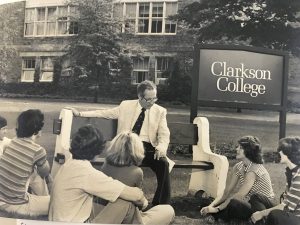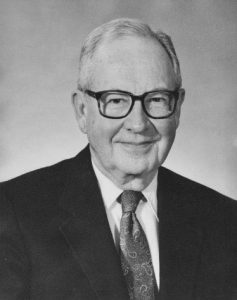Clarkson University President Emeritus and former Trustee Robert A. Plane passed away Monday at the age of 90.
Plane served as Clarkson’s 12th president from 1974-1985, later serving as a Clarkson trustee from 1988 to 1992. At the time, Plane completed the second-longest presidency in Clarkson’s history.
“President Plane was a well-known icon in chemistry, in higher education and in Clarkson’s history,” said Anthony G. Collins, the President of Clarkson University since 2003 and a member of the Clarkson faculty since 1982. “He was steadfast in his endearing commitment to students and the greater Clarkson community and to advancing the mission of the institution. During his tenure at Clarkson, we experienced tremendous growth in enrollment and initiated the framework to build national attention for our faculty and portfolio of research.”
After he assumed the post in 1974, Clarkson grew from 2,700 to 3,900 students.
During Plane’s tenure in 1984, the New York State Board of Regents voted to accord university status to the then Thomas S. Clarkson Memorial College of Technology. From its initial offering of three subjects to 17 students in 1896, Clarkson had grown to offer accredited undergraduate programs in 20 areas, master’s programs in 15 areas, and Ph.D. programs in five areas to approximately 4,000 students.
In making the announcement of the name change, Plane said, “I am pleased that the Trustees have taken this step to petition the New York Board of Regents to change the name because I am convinced that this designation better describes Clarkson and that the name change will make Clarkson and its degrees more valuable and appreciated, both nationally and internationally.”
New buildings erected during Plane’s tenure included the Andrew S. Schuler Educational Resources Center, the Andrew M. Schuler Indoor Recreation Building, the Townhouse apartments, and the William J. Rowley Engineering Laboratory building. Several buildings were renovated, including Holcroft, Old Main, and Walker Arena. The University also obtained Clarkson Seven Springs, a skiing facility in Parishville.
 At the end of his first year, Plane initiated a $12 million capital campaign, The Clarkson Plan, which was brought to a successful conclusion four years later, and provided funding for both the ERC and the Indoor Recreation Building. In 1982, Plan II was begun and raised $15 million. Alumni support increased from $200,000 to over $600,000 per year, and the endowment grew from $5.5 million to over $19 million; research support increased from $41.1 million in 1974 to $43.7 million in 1982-83.
At the end of his first year, Plane initiated a $12 million capital campaign, The Clarkson Plan, which was brought to a successful conclusion four years later, and provided funding for both the ERC and the Indoor Recreation Building. In 1982, Plan II was begun and raised $15 million. Alumni support increased from $200,000 to over $600,000 per year, and the endowment grew from $5.5 million to over $19 million; research support increased from $41.1 million in 1974 to $43.7 million in 1982-83.
New academic programs begun during his presidency included technical communications, biology, computer science, industrial hygiene and environmental toxicology, computer-based management systems, industrial management, and marketing. The College also established the foundation curriculum, which included the requirement that every student, whatever his or her major, had to take at least one course in each of the University’s three schools — engineering, management, and science –and had to pass a writing proficiency examination prior to graduation.
In 1977, emerging from a suggestion of Plane’s wife, Mary, to create a “bridging year” between high school and college for gifted students, Plane cofounded a new branch of education when 22 young men and women enrolled on campus in The Clarkson School. The Clarkson School offered students a self-contained community within the College where students who had completed their junior year in high school fulfilled their high school requirements while completing their first year of college.
In 198, Clarkson was the first college in the nation to provide each freshman with a PC, when each incoming first-year student was supplied with a Zenith Z-100 desktop computer. News media from all over the country came to Clarkson to witness this first in collegiate education and by the next year, the story had gone global with Clarkson featured in national and international media.
Upon his retirement in 1985, Plane was awarded a Clarkson honorary degree and had received the Golden Knight Award, the previous year.
A professor of chemistry, Plane’s field of specialization was metal ions in solution and in enzymes. He co-authored several books, published more than 70 research papers, and was co-editor of the Physical Inorganic Chemistry Series of Monographs.
Plane was born on September 30, 1927, in Evansville, Ind. He received his bachelor’s degree in chemistry from Evansville College in 1948. He later earned his master’s degree and Ph.D. from the University of Chicago.
In 1952, he joined Cornell University as a chemistry instructor. In 1954, Plane co-authored Chemistry, a textbook that was used in thousands of classrooms around the nation. In 1961, he was promoted to full professor. He became chair of the chemistry department in 1967, and from 1969 to 1973 he served as provost at Cornell.
After leaving Clarkson, Plane returned to Cornell to lead the New York State Agricultural Experiment Station at Geneva from 1986 to 1990. Following that, he was president of Wells College from 1991 to 1995. He was also a National Institute of Health Special Fellow at the Nobel Institute in Stockholm, Sweden, and at Oxford University; and a visiting scientist at the University of California at Berkeley. He had been an honorary trustee at the University of Evansville (Ind.) since 2011
Since 1995 Plane and his wife, Mary, have lived in Albuquerque, New Mexico. They have four children. A memorial service is being planned at the Cathedral of St. John (Episcopal) and will be announced at a later date. In lieu of flowers, and in light of his lifelong belief in the value of education, his family asks that donations be made to any of the institutions where he worked or to the school, college or university closest to your heart.
Clarkson University educates the leaders of the global economy. One in five alumni already leads as an owner, CEO, VP or equivalent senior executive of a company. With its main campus located in Potsdam, N.Y., and additional graduate program and research facilities in the New York Capital Region, Beacon, N.Y., and New York City, Clarkson is a nationally recognized research university with signature areas of academic excellence and research directed toward the world’s pressing issues. Through more than 50 rigorous programs of study in engineering, business, arts, education, sciences and the health professions, the entire learning-living community spans boundaries across disciplines, nations, and cultures to build powers of observation, challenge the status quo, and connect discovery and innovation with enterprise.